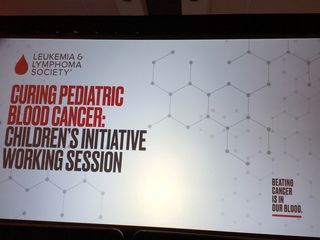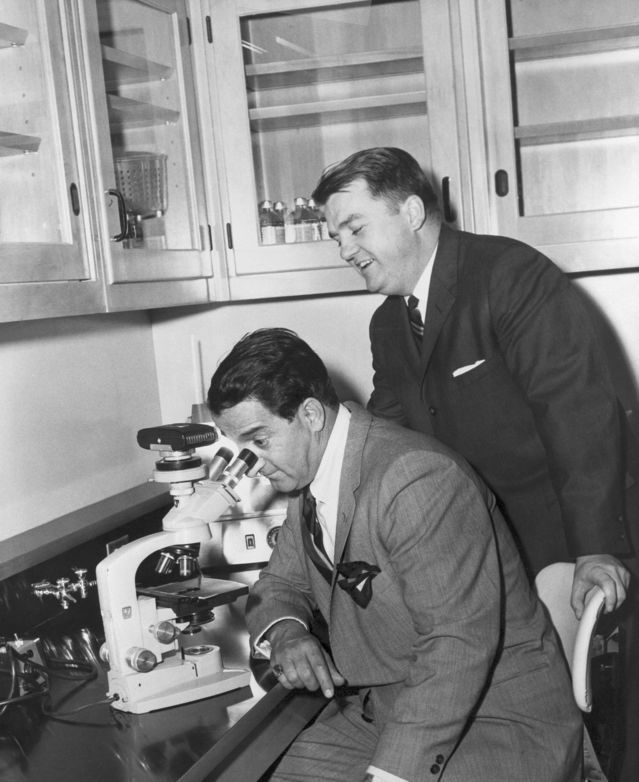Teamwork
Cooperation Is a Key Component of a New Cancer Initiative
LLS brings hospitals together to take next step against childhood disease.
Posted October 2, 2019

Immunotherapy. Proton beam treatments. Precision medicine.
Due to such advances and more, medical experts believe that we’re on the cusp of curing various forms of cancer in our lifetime. Another favorable sign occurred when the Leukemia & Lymphoma Society recently announced that it will launch a major clinical trial for children early next year, involving up to 200 hospitals around the world.
In detailing the Children’s Initiative in Atlanta, though, the LLS acknowledged that the biggest hurdle isn’t soaring drug costs or how elusive cancer is to control. It could well be a lack of cooperation between hospitals and institutions.
“We’ve never seen anything on this scale,” says Dr. Todd Cooper of Seattle Children’s Hospital, who will head the new clinical trial. “Our goal is to get everyone to the table and work together. We’ve come to realize that’s the only way to make further progress.”
According to the LLS, leukemia is the most common cancer in children. Despite major advances 50 years ago, when a select group of doctors dared to take on childhood cancer, many contend that not enough has been accomplished in recent years. As a result, the LLS is taking the leadership role with this new initiative. Its goal is to raise $50 million of new funding over the next five years.
“While treatments for adult cancers have advanced dramatically, the same cannot be said for pediatric cancers,” says Dr. Gwen Nichols, the LLS’s chief medical officer. “When it comes to cancer, children are not just ‘little adults.’ Their cancers are different, and we need to understand them and treat them differently.”
To further such progress, a new database is being assembled in which participating hospitals and medical personnel will tabulate their findings and results.
“Everything is incentivized against sharing data right now,” says Dr. Samuel Volchenboum of the University of Chicago. “This new approach makes it imperative to share everything. We’re going to make it easy to do the right thing. … In a few years, if you’re not sharing your data people are going to be asking why.”
Many children today are still being treated with chemotherapy drugs and procedures developed in the 1950s and 1960s. Those advances, first directed by such medical pioneers as Dr. Donald Pinkel and the late Dr. James Holland, took acute lymphoblastic leukemia in children from a 10 percent death sentences to a 90 percent survival rate it has today.
“We had no choice but to come together because the rest of the medical world was so opposed to us and what we were doing,” says Dr. Lucius Sinks, former director of pediatrics at the Roswell Park Cancer Center in Buffalo, N.Y. “A generation ago, many in medicine thought it was impossible to cure any kind of cancer in children. Back then we may have disagreed about approaches and procedures, but we had no choice but to stick together. To work as one.”
That may be the biggest challenge for the growing numbers participating in the LLS Children’s Initiative. In touring the country last year, discussing my book "Cancer Crossings: A Brother, His Doctors and the Quest for a Cure to Childhood Leukemia," I was heartened by the new programs and procedures now in place, with other ones soon coming online. Almost every institution I visited was justifiably proud of its work.
Yet almost everywhere I went, on both coasts and in between, many hospitals also believed they were making the most progress. In essence, they were No. 1. If that’s the case, who will be willing to take a backseat? Play more of a supportive role?
“To make this work we need to come together as a medical community,” says Dr. Jeffrey Rubnitz of St. Jude Research Children’s Hospital. “Those of us at St. Jude realized we cannot do it alone. [The LLS Initiative] can really break down those silos.”
It will have to for more children suffering from cancer to be truly helped.





